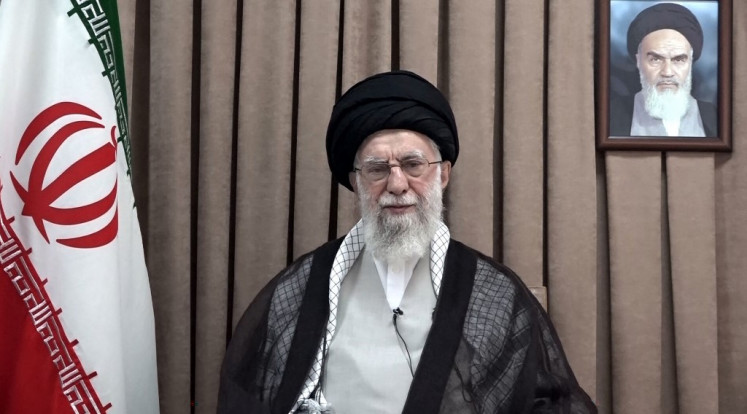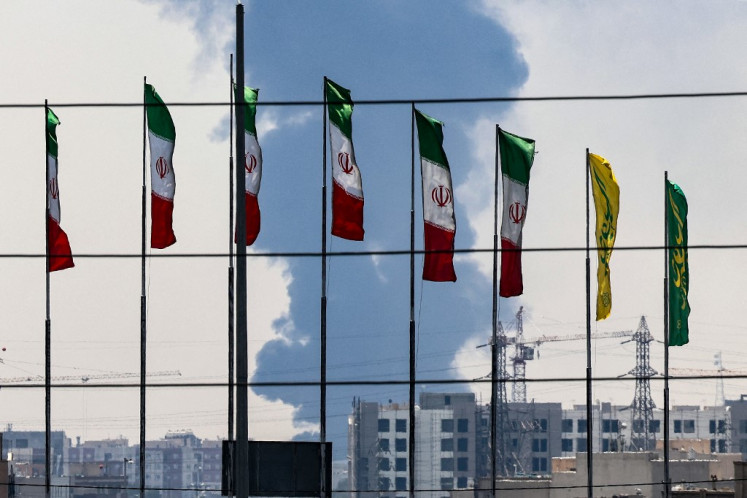Popular Reads
Top Results
Can't find what you're looking for?
View all search resultsPopular Reads
Top Results
Can't find what you're looking for?
View all search resultsReleasing Ba’asyir, opening Pandora’s Box
The government has the power to release convicts, including firebrand Muslim cleric Abu Bakar Ba’asyir, who was found guilty of committing acts of terrorism
Change text size
Gift Premium Articles
to Anyone

T
he government has the power to release convicts, including firebrand Muslim cleric Abu Bakar Ba’asyir, who was found guilty of committing acts of terrorism.
Ba’asyir is currently serving a 15-year sentence that is to end in 2025. By law he can apply for parole after serving two-thirds of his sentence, which he reached on Dec. 13, 2018.
However, there is a number of requirements Ba’asyir had to meet and he apparently rejected them. He had to be willing to cooperate with law enforcement to bring similar crimes to justice, he had to show remorse for the crimes he committed and he had to pledge allegiance to the Unitary State of the Republic of
Indonesia.
Other than getting out on parole, Ba’asyir could also be released if President Joko “Jokowi” Widodo grants him clemency.
This option, however, may not be on the table because it requires the submission of an application by a convict who admits to having committed a crime and seeks mercy from the President. In various statements made to the media, Ba’asyir has been adamant that his actions were not crimes and that he would not ask for forgiveness.
At this point Yusril Ihza Mahendra, the President’s legal counselor, negotiated to release Ba’asyir without making him meet those requirements. Yusril insisted the requirements were not necessary since Ba’asyir was found guilty prior to the 2012 government regulation stipulating the three conditions coming into force.
Yusril said he believed the requirements violated the non-retroactive principle, therefore a previous regulation signed in 2006 — which did not require a loyalty statement — should prevail. There are at least two flaws in Yusril’s — hence the government’s — argument.
First, there is no violation of the non-retroactive principle. Although Ba’asyir was convicted in 2011, he applied for parole several years after the implementation of the 2012 regulation.
Regardless of when a person is convicted by a court, the mechanism for granting remission, leave, or parole should be in accordance with the rules that are in effect at the time of the filing of the application.
Second, the main function of imprisonment is incapacitation and rehabilitation. By being in custody, Ba’asyir’s ability to coordinate a terrorist network is reduced. His crime is non-physical, based on ideology. Prison provides a secure environment to contain any attempts to further instigate violence against the state and members of the public.
On rehabilitation, it is expected that while in prison terrorism convicts can take part in deradicalization programs. Neither of these two main functions of Ba’asyir’s sentence would be served if he is released without meeting the three conditions.
Third, the court handed down a harsher sentence to Ba’asyir after the last guilty verdict for two reasons: He committed a similar crime in the past and committed an extraordinary crime, i.e. terrorism. That is why the 2012 regulation stipulates more stringent conditions in his case, the very purpose that Yusril would try to get the President overrule it.
There are a number of options the government may consider, however.
First, imprisonment should only take freedom of movement away from convicts, but overcrowding has deprived convicts of dignity and humanity. The situation affects the elderly with health problems like Ba’asyir. The government needs to set a minimum standard to serve the basic needs of elderly prisoners or inmates with health problems.
Second, gradual assimilation may be a better option. The Law and Human Rights Ministry can relocate Ba’asyir to another prison where he can serve the rest of his sentence. The place could be an official house adjacent to the prison, where Ba’asyir can live with his immediate family and receive better health care.
Communication and visits would still be regulated and supervised. This gradual treatment would serve all purposes: humanitarian, rehabilitation and incapacitation of possible re-offending.
Third, the President could grant amnesty to Ba’asyir. This option requires Ba’asyir to neither acknowledge the government nor declare his loyalty to the state. However, this needs to be discussed with the House of Representatives, although the final decision lies with the President. This option comes with a risk because Ba’asyir may relapse into his network activity after his release.
Granting Ba’asyir parole by overriding the requirements stipulated by the law would be a direct intervention by the President in the legal process.
It would all but violate the government’s own commitment to the rule of law and tarnish the image of the government as it is completing its mandate, which ends in October.
The government should consider other options that would not adversely affect the rule of law, like gradual assimilation or amnesty.
_______________________
The writer is completing his PhD in criminology at the Australian National University.









